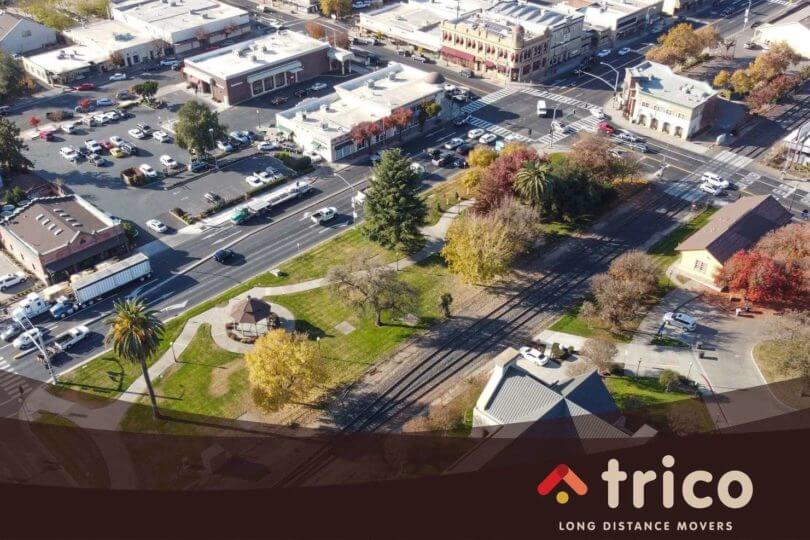Although moving to a small town is usually the right thing to do, your personal preferences have the final word and determine if you should embark on such a journey. Add your plans for the future to the mix, and you’ll easily weigh all the pros and cons of small-town living.


Whether it is family we’re talking about, advancing your career, or something else entirely, it’s vital to take them into account when choosing a place to call home. And that’s why we’re here, to help you understand what kind of life is waiting for you outside the city.
According to a recent survey, nearly half of the U.S. adult population prefers small towns and rural areas to large cities, especially during the coronavirus outbreak. Many were exhausted from being confined in their homes even before the global crisis. However, their yearning for a somewhat freer way of living has increased drastically over the last two years.
Although you’re the only one who can answer the question: Is it better to live in a small town, given the circumstances, it is still important to find a way to continue with regular life activities as soon as possible. Relocating to a new home means choosing a safe place to live, and an opportunity to be in a quieter and less urban area will provide that. So don’t forget to put this one on your relocation checklist.

Does it cost less to live in a small town? Or is the dollar worth the same, no matter where you are? We all know that money is only a tool for a more quality life, but that quality certainly changes depending on where you reside.
Smaller towns, in general, are regarded as more affordable, not only because of monthly rent and home prices but also because the other expenses are cheaper, such as groceries, goods, and services, restaurant and gas prices, etc. Take Washington, Illinois as an example, with a cost of living index of 84, and compare it to neighboring Chicago, with 106. Since the U.S. average is 100, you can imagine how different it would be if you lived in either of these cities. With Numbeo, the world’s highest cost of living database, you can compare any two places you’d like to live in.
If you’re wondering how to move to a small town, you should give your best and try to save money on relocation costs, too. So before you dive into organizing the move, take one of our most brilliant relocation tips and downsize your place correctly. You may be surprised, but deciding what to keep and what to throw away will drastically change the final cost of your move and help you move efficiently.
Whether you’re relocating to another state alone or moving cross-country with kids, expect housing to be a significant expense on your list. However, these can be twice as expensive in metropolitan areas, so people often choose to move to the suburbs or a rural community. The figure for a median home price will always depend on the location since it’s one of the most valuable factors in real estate. Just compare the figure of $273,000, the national median home price in 2020, to West Virginia, for example, where the median home value was under $115,000 at the end of the same year.
If you have ever resided in a somewhat bigger place, then you probably already know what it is like to be stuck in traffic all the time. Using nearly every form of public transportation to get where you headed usually means hours of your day spent commuting. Not to mention the struggle (or the war, truth to be told) when it comes to parking.
On the other hand, living in a small town will spare you the trouble of sitting in traffic and being in a constant crowd, but you will need a car to get around successfully. Not to mention that you’ll not be needing ride-sharing apps anymore, such as Uber and Lyft, and that you’ll be able to enjoy biking around.
Believe it or not, your new location will play a significant role in car insurance rates. It appears that state rates are based on state-specific laws. However, they are also influenced by location-specific factors each area has.
As it turns out, all major cities have more accidents due to more traffic. Moreover, metropolitan areas are much pricier than rural areas, which leads to much higher costs of damage repairs. The same goes for car insurance rates, although other rating factors include the type of car, your driving history, the number of drivers and vehicles, and the type of coverage you choose.

When deciding where to live, especially if you’re relocating without a job, keep in mind that there will be fewer career opportunities outside the city. The less populated the area is, the narrower the spectrum of industries to choose from. This easily translates into trouble finding work, which means you may have to look for it in neighboring places or even further away, in neighboring cities.
Unless you’re planning an office move because you’re relocating your business to another state, in which case a rural area could be a right fit. Then again, if you fail to choose the right location, not even a well-polished plan could save you. So give yourself time to think it through.

It’s no wonder that many smaller communities all over the U.S. are experiencing medical staff shortages, at least to some degree. Local doctors are either retired, overworked, or taking over a private practice would be too expensive for them. So, it’s pretty common for most young doctors to opt for city hospitals, which are sometimes miles and miles away.
On the other hand, small-town life has a more relaxed pace, and you can not expect it to function the same as the systems organized within big places. Here, you most likely do not even have to book a doctor’s appointment because you’ll be seen right away. Then again, if by some unfortunate circumstance you need specialized treatment, you better start packing your bags right away.

Individuals from rural areas can enroll in some of the most prestigious schools in the state. However, we’re all well aware that, more often, the situation is reversed. Although everyone pursues a bright future, people outside city limits usually find it harder to reach it. Unlike smaller towns, the number of well-respected schools and universities in metropolises is incomparably more significant.

Whatever your reasons to move, if you decide to replace a big place for a smaller one, we hope you’re not doing it just for fun. It doesn’t mean there are no entertainment possibilities, but if you’re there to immerse yourself in it and let loose, well, you probably don’t understand the concept of a slow-paced life because that’s what you’ll find in less urban areas.
When thinking about what to do when you move to a small town, imagine all kinds of outdoor activities and local events you can attend, from hiking, camping, and fishing to picnics, bonfires, and fairs. However, don’t expect to be able to attend concerts or festivals that often.

Picking a city would be a much simpler choice for people if they only knew what the community is really like. Like many of us do in a big city, feeling outnumbered certainly doesn’t help while adjusting to a new place and coping with relocation depression. But the friendly atmosphere you can easily find once you settle down in your new suburban home comes as one of the most vital advantages.
You might be worried about how safe your neighborhood is, but don’t let it stop you from putting yourself out there. Getting to know the folks next door and the surroundings will give you a sense of belonging, and that’s what you need when you move far away from family. Also, there are probably various weekly activities to get involved in, but what if you host one? It’s the best way to make friends in a new city and strengthen the relationships between yourself and the community.
Well, we guess that simplicity of life would be unarguably the first advantage for many parents. Considering the responsibilities of raising a family, the simpler it gets, the happier everybody is. Just think about it. When asking yourself how to live in a small town and an easy answer comes your way – you can’t afford to ignore it.
When planning a move, safety must be on the top of your priority list since you are responsible for the safety of the entire family. Luckily, rural areas and suburbs are known for having low crime rates. Some places are so safe that homeowners do not lock their houses or cars because they are not worried about being robbed.
To hear more about why people choose to move away from metropolitan areas, check out the video below.
Even though there are many different points to consider when choosing between a small community and a big city, there is a way to reduce relocation stress at least. No matter your final destination, selecting a long-distance relocation company will help you get there without a hitch. Whether it is a big house and a yard that you’re looking for or the vibrant city atmosphere, with professional packing and other long-distance moving services provided, you’ll have enough time to make an informed decision and start afresh.